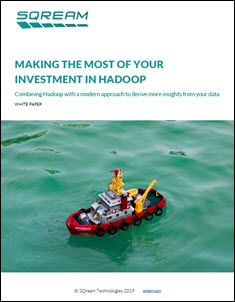Hadoop. Once largely unknown, hit the scene in part due to the explosion of unstructured data. It’s common for uses like web analytics, which requires more flexibility. And shortly after the open-source software was accepted due to necessity, it has been adopted for structured use-cases, as well.

According to a new report from Sqream DB, in these cases, SQL query engines have been bolted on Hadoop, and convert relational operations into map/reduce style operations.
The BI pipeline built on top of Hadoop — from HDFS to the multitude of SQL-on-Hadoop systems and down to the BI tool — has become strained and slow. — Sqream
The issues creating these problems include:
- Tedious data preparation, requiring hours or days of coding
- Inflexible infrastructure that prohibits ad-hoc queries on large quantities of historical data
- Slow access to data, inaccurate results, and lengthy time-to-insight
These concerns can result in “lost insight, troves of under-analyzed data, frustrated data teams, and ultimately, lost revenue,” according to the report.
Are your data teams are already spending too much time preparing their data for analysis? Or is your business looking to reduce query execution time, or to enable queries that are currently just not running?
Sqream asserts today’s enterprises should explore business insights hidden in their data with a solution that complements and enhances their Hadoop system.
This white paper is for any data professional – on the infrastructure, data engineering, data science or BI side — who is experiencing issues analyzing massive data due to data ingest challenges, lengthy and tedious data preparation cycles, or long-running queries that hinder comprehensive analytics.
Sqream explores the root cause of these performance issues, and how a new approach to data analytics can alleviate them, and highlights both common issues with Hadoop and how to deliver results for Ad-Hoc analytics.
Download the new white paper, “Making the Most of Your Investment in Hadoop,” through which SQREAM explores an approach to Hadoop that aims to help businesses reduce time-to-insight, increase productivity, empower data teams for better decision making, and increase revenue.




